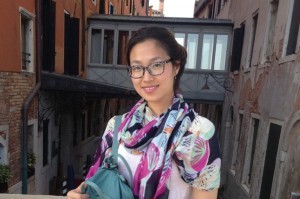In the dark, Lund University is participating in a global tug-of-war for the world’s top students. The University pays agencies from all around the world to steer foreign students towards Lund. But what are the agencies actually paid to do?
Engineer student Echo Du from China decided just before the last days of application that she wanted to study in Europe. She started googling different universities and programs and realised that time was short. In order to straighten out the situation, she turned to an agency and was told about Lund University.
“The agency helped to produce a list over universities that could suit me. One of them was Lund. When a representative from the University met with me in China, I got a good impression and chose to apply there”, she says.

Not Unusual
Echo Du is not alone. Every year, about a third of all foreign students are recruited to Lund University through various agencies in countries such as China, India and Indonesia. The reason for this situation is the tuition fees for international students that were introduced in 2011. When education seized to be free, it became harder for the Swedish universities to compete for the best international students.
“Agencies are an established form of marketing amongst the world’s universities, so we chose to get in the game”, says Maria Lindgren, international communicator at Lund University.
A World of Agencies
When opening their eyes towards the world, Lund University discovered that there already were agencies guiding students towards Lund. One had just not noticed them. After a strict process of elimination, Lund University signed a cooperative agreement with twelve agencies the world over.
“We have a pretty rigorous process for finding agencies. Since they will represent Lund in that country, working with them involves a certain risk”, Maria continues.
Maria Lindgren stresses that Lund University’s profile, both in Sweden and abroad, is built on the University’s keeping of a high international standard. An important part of defending this position is to keep attracting international top students.
The agencies have two assignments: They help to attract international top students to Lund, and they help local students through the international university jungle. For these services, the agency is awarded ten percent of the student’s first tuition fee, 10- 12,000 Swedish kronor per student, from Lund University.

Paid 10,000 Swedish Kronor
Because the University pays agencies, their services should be more or less free for the students. But the students Lundagård has spoken to says that they have paid about 10,000 Swedish kronor for the agencies’ information. They have also not been informed of the fact that the University pays the agencies.
“It is not Lund University who pays the agency but me, since I’m the one going”, says Coraline Zhang, another student who came to Lund from China through an agency connected to Lund University. Neither Echo Du has heard about this.
“I’m not sure, but I don’t think that Lund pays the agencies anything. It’s probably the one going who’s paying”, she says.
Maria Lindgren is surprised that Coraline Zhang and Echo Du have paid these amounts of money to the agencies.
“It’s surprising, since we counted on the agencies charging less. But at the same time it is the students own choice if they’re willing to pay”, she says.
Nagarjuna Suryadevara works at the Indian agency SMY Cosmos, one of Lund University’s official collaboration agencies. The office has specialised in northern Europe, and also cooperates with Malmö University and Chalmers. Nagarjuna Suryadevara points out that the agency’s task is to guide the student from the choice of university to their arrival in Sweden.
“We help them with pretty much everything from filling out the resident forms to explaining the differences between the university worlds in India and Europe”, he says.
Many Who are Not Serious
The agencies’ work methods differ from country to country. Coraline Zhang says that she had to fill out the application forms by herself.
“Actually, the agency only gives you the information so that you can choose what school to apply for. It’s possible to get hold of the same information by yourself, but it’s so much faster to go through an agency”, she says.
Besides the twelve agencies that Lund is cooperating with, there many unofficial ones who charge money to supply foreign students with information. Even if many of the students that come through these alternative routes are satisfied, there are agencies carrying false information.
“There are unreliable agencies out there who see this as a good way to make money. Unfortunately there is not much we can do about this. It is impossible for us to check what a single agent says to a student in for example Pakistan”, says Maria Lindgren.
For Lund University, these agencies act as an expensive middleman. Maria Lindgren feels that it would be best if the students themselves contacted the University.
“But it doesn’t work that way. There is a safety in having a native person of flesh and blood to speak with. We have even been in direct contact with students who have chosen to take a detour through an agent after having spoken with us. They simply trust the agency’s information more”, says Maria Lindgren.
Article: Marcus Lesseur Bornlid and Gustav Wirtén
Translation: Viktor Jönsson






